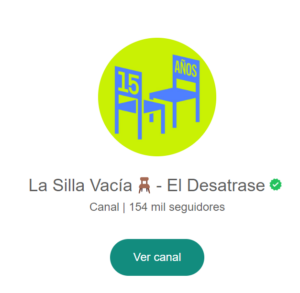For years, independent digital media from Latin America have explored the instant messaging application WhatsApp to further connect with their audiences. This tool allows business accounts to be created, messages to be sent through broadcast lists, statuses or stories to be published, and groups and chatbots to be created. For less than a year, information can also be distributed through channels.
Although several independent digital media in the region have opened their own WhatsApp channels, they also denounce the difficulties they have faced when requesting verification of their accounts by Meta, the company that owns the application. It’s a situation that increases the existing gap between large media conglomerates and other news organizations in terms of channel follower growth, according to what some media told LatAm Journalism Review (LJR).
WhatsApp channels are a one-way and vertical communication function, launched globally in September 2023, although they have been working gradually since June in some countries. They are found in the Updates tab, where the statuses, or stories, of the contacts are also located. In this way, they are separated from personal chats, groups and communities.
Channels allow the administrator to distribute information to their followers either through text, polls, images, videos, documents or voice files.
“The WhatsApp channel is a strategic place to strengthen our relationship with the audience. We believe that it is a space in which a lot of information is shared and we want to be there to contribute to that circulation of information with our work,” Daniela Amaya Rueda, editor and person in charge of WhatsApp strategy for Colombian media outlet La Silla Vacía, told LJR.
La Silla Vacia has four channels on WhatsApp. There is one for each of the three main cities in the country: Bogotá, Medellín and Cali, where they have more than 5,000 followers. The media outlet also has a channel to send daily summaries of national news, called La Silla Vacía-El Desatrase. That one has more than 155,000 followers.
“We decided to have four channels because we believe that local information is key for our audience in the regions, but it is not necessarily of interest to a general audience,” Amaya Rueda said.
Before creating the channels, La Silla Vacía focused its WhatsApp strategy on broadcast lists. However, according to Amaya Rueda, they have been able to reach more people and in a more efficient way with the channels.

El medio colombiano La Silla Vacía cuenta con un canal en WhatsApp para enviar resúmenes diarios de las noticias nacionales, llamado La Silla Vacía- El Desatrase, donde tienen más de 154 mil seguidores. (Foto: captura de pantalla).
Another media outlet that opened a WhatsApp channel as soon as the platform launched the function was Correio Sabiá from Brazil. It is no surprise considering that Correio Sabiá is the first news organization in Brazil created on WhatsApp.
Correio Sabiá was born during Brazil's 2018 presidential elections, when there was talk of the first big false news boom. According to what Maurício Ferro, leader of Correio Sabiá, told LJR, the initiative's proposal was to use the same methods of disseminating fake news on WhatsApp but sending verified and quality content.
They began by creating WhatsApp groups with people close to the team, sending journalistic content, from Monday to Friday. In a process similar to word of mouth, they generated trust and expanded their community.
Groups emerged on WhatsApp before channels and are considered personal chats where up to more than 1,000 people can communicate with each other.
“We sent a summary of essential news from Monday to Friday in groups and channels. The difference is that, with channels, as they are positioned in a more hidden section of the app, we can send more content throughout the day without users feeling worn out by it. In groups, we limit ourselves to one daily message, which contains a summary of essential news,” Ferro said.
The biggest technical difference between groups and channels is privacy. In the channels, the telephone numbers of the people who receive the content are not exposed, nor are those of the channel administrators.
“Groups, for example, are much better for the publisher. This is because we have more information about who the audience we are speaking to is. You can know the prefix of the telephone number, we often know the person's name, what time the message was viewed... all of this helps to understand the audience. You can also find out who left the group and ask for feedback. There is a series of information that allows you to better work on audience engagement,” Ferro said.
These were also some of the reasons why the team at Efecto Cocuyo, an independent Venezuelan digital media outlet, was slow to make the jump to channels. This media outlet opened a channel in May that has 174 followers to date. However, they have 11 active groups that total more than 1,000 users.
“One of the reasons why we didn't open the channel sooner was because of the administrators’ issue. Only one person could manage. Now WhatsApp does have the option of multiple administrators, so that facilitates the dynamics in the team. Anyone who is on duty at that moment can update the channel,” José Ochoa, social media and audience coordinator for Efecto Cucuyo, told LJR.
On the other hand, according to Ochoa, voice messages can be sent through the channels but not previously recorded audio files. This prevents Efecto Cocuyo from sending, through the channels, one of its most prominent news products, Cocuyo al Oído, where it summarizes the most relevant information of the day in audio format.

Correio Sabiá was born during Brazil's 2018 presidential election when there was talk of the first big fake news boom, Maurício Ferro, leader of Correio Sabiá, told LJR. (Photo: courtesy)
According to those interviewed for this report, there is no "better" or "worse" option when deciding between groups and channels. Everything will depend on the audience of each media outlet and the way the organization wants to relate to it.
Verification issues
One problem reported by the teams of the independent news organizations interviewed is the delays on the part of Meta, the company that owns WhatsApp, in obtaining the verified account badge.
This green symbol indicates that an account has been verified based on its activity on WhatsApp and is official.
Marco Sifuentes, director of La Encerrona, a Peruvian digital media outlet with a popular newscast on YouTube, explained that they have 3,000 followers on their WhatsApp channel but growth has been slow due to the lack of the verification badge.
“We have had problems verifying our WhatsApp account and that is why we do not get many visits to our program through there. WhatsApp makes verification a very long process,” Sifuentes said.
Efecto Cocuyo and Correio Sabiá had the same problem. Since they are not verified, they do not appear in the channels search engine.
“Their big problem is that most independent organizations still don't have the verification seal. This creates an abyss in the news ecosystem, because large conglomerates, which are verified, can be easily found by users of the messaging app. Thus, they can grow their audience a lot,” Ferro said
The Brazilian journalist used the example of Grupo Globo's G1, which in just a few weeks after its creation managed to accumulate millions of followers on WhatsApp.
“The practical effect of this is that the big ones are getting even bigger. This is terrible for the plurality of the news ecosystem, which has experienced a boom in startups that do extremely relevant work serving local audiences,” Ferro said.
“Platforms should dialogue with the main associations in the news ecosystem to give seals to journalism, because our work is fundamental to keeping audiences well-informed and represented, especially considering election season,” Ferro said.